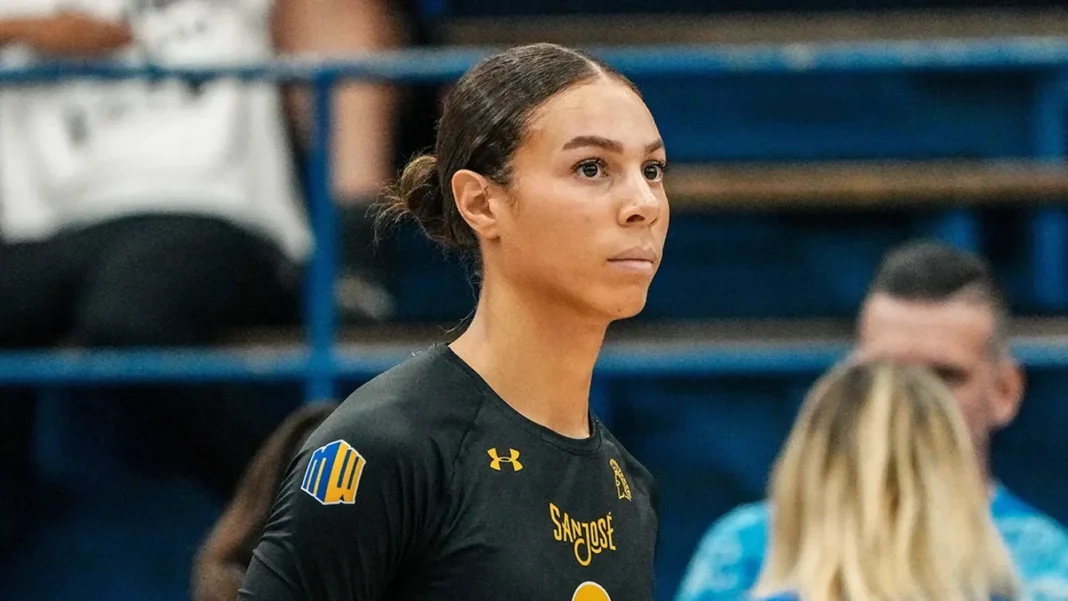Iowa Republicans held a massive celebration a couple of years ago when Gov. Kim Reynolds signed a law that purported to protect women’s sports. Common-sense supporting Iowans thought the law would protect fairness and opportunities for women in sports in Iowa.
Even Gov. Kim Reynolds touted the law at her fundraiser on Saturday, claiming that Iowa passed a law to protect girls’ sports. The line is popular and has received applause every time I’ve heard it repeated.
But is it true?
According to some Republican lawmakers, and more importantly, how the law has played out thus far, Iowa doesn’t have a true “Protect Girls’ Sports” law.
In early September, San Jose State picked up a victory against the University of Iowa volleyball team. The match was played in Iowa City. As it turns out, according to reports, San Jose State’s team includes a male who identifies as a female.
Since then, a handful of teams have decided to simply forfeit matches against San Jose State.
Based on reports, it sure seems San Jose State is not disputing that “Blaire” Fleming is transgender. According to a story written in the Denver Post, “a trans player took the court” for San Jose State.
Get this — the San Jose State coach actually played the victim. The article, written by former Des Moines Register columnist Sean Keeler, quoted coach Todd Kress as saying his team is “disappointed” it is “losing opportunities to play.”
“That’s very unfortunate when it comes to these young women who have earned the right to step on the court and play,” he reportedly said.
Kress, who again didn’t seem to deny a biological male is indeed on his team playing against females, blamed government and politics for intertwining with college sports.
“That’s one area that government I don’t think should be involved,” he said.
Then the writer criticized Southern Utah, Utah State, Boise State and Wyoming — schools that decided not to play the women’s volleyball match against a women’s team that includes a man.
Maybe I’ll revisit the ignorance of Keeler’s piece later. For now, I’ll stick to the topic at hand.
Considering all the pieces of this not-so-seemingly complicated puzzle, San Jose State indeed has a “transgender woman” playing women’s volleyball. This would mean a man is playing women’s volleyball for San Jose State. This would mean that here in Iowa, a man was allowed to play in a women’s volleyball match.
Here is what House File 2416 says, in part…
“An interscholastic athletic team, sport or athletic event that is sponsored or sanctioned by an educational institution or organization must be designated as one of the following, based on the sex at birth of the participating students:
- females, women or girls
2. males, men or boys
3. coeducational or mixed
Only female students, based on their sex, may participate in any team sport, or athletic event designated as being for females, women or girls.”
Now, I have talked with some Republican lawmakers who said they’ve been told the law doesn’t apply to out-of-state teams. I think the law states that an event sponsored by the University of Iowa (which the volleyball match certainly was) then the match must be designated as being for women, men or mixed.
The women’s volleyball match was definitely declared to be for women. A male was allowed to participate in the match.
I could be wrong, but I don’t see where in the law it specifies the it only applies to Iowa teams. To me, it sure looks as though it applies to athletic events in Iowa — which would apply the law to any team regardless of where they’re from if they’re playing here in Iowa.
The Iowa Standard has contacted Attorney General Brenna Bird’s office to get a response. We’ve also reached out to Gov. Reynolds’ office. We’ll publish any response we receive.
Keep in mind the law allows for civil action against various parties if the law isn’t followed. The University of Iowa certainly opened itself up to a potential lawsuit by allowing its players to compete. Perhaps San Jose State did too.
Here’s the deal…if Iowa’s “Protect Girls’ Sports” law doesn’t apply to teams from out-of-state, then it is irrelevant. And Iowans are being lied to every time a Republican tells them that we protect women’s sports in Iowa.
Because if it is true that Iowa’s law doesn’t apply to out-of-state teams, then we don’t.
I’ve seen a number of teams compete against Minnesota, Nebraska and South Dakota high schools. Obviously, college teams play against out-of-state teams nearly every time they take the field or court.
If the law is not applicable to out-of-state teams, then the Republican legislature and Gov. Reynolds failed to protect girls’ sports.
I don’t believe all of the Republicans in the legislature would allow that to happen. I believe for some of them, it would simply be an oversight.
Regardless, the law didn’t work. Women volleyball players at the University of Iowa took the court against a male. That’s not supposed to happen here.
If it’s true the law doesn’t apply to out-of-state teams, then it’s time for Republican lawmakers to go back to the drawing board. And in the meantime, Republicans should stop claiming they protected girls’ sports here in Iowa because as it played out in real life, they didn’t.

















